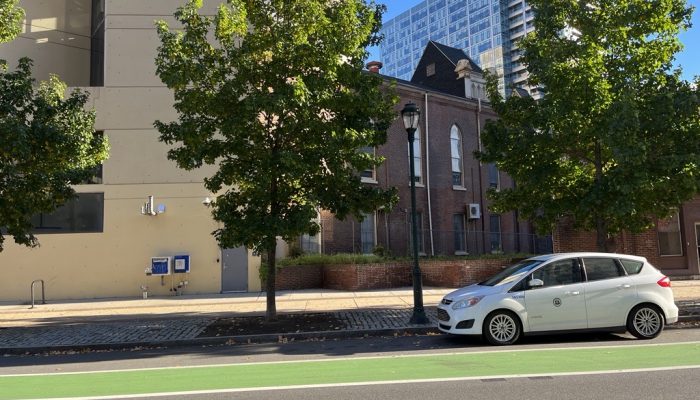In 2021, the Office of Sustainability, in partnership with the Department of Fleet Services, released Philadelphia’s Municipal Clean Fleet Plan. The plan provides the City with a strategy to replace over 5,000 municipal vehicles with clean and electric vehicles (EV). Replacing the City’s fleet with electric and clean alternatives is critical to reducing municipal emissions and reaching the City’s goal of carbon neutrality by 2050. In 2021, the City’s fleet represented about 13% of the municipal government’s carbon footprint.
The Office of Sustainability and the Department of Fleet Services have made significant progress electrifying the City’s fleet and installing charging infrastructure throughout municipal facilities. Highlights include:
- The number of electric vehicles has dramatically increased from 34 plug-in EVs in 2020 to 248 plug-in EVs in active service today.
- The number of municipally owned EV chargers has more than doubled since 2020 with 109 plugs currently available throughout the city.
- The City established a contract with the charging provider EVgo to allow employees to fast charge their work vehicles.
- Managing Director Tumar Alexander issued Managing Director’s Directive #69 on the Clean Fleet Policy to establish the clean fleet hierarchy and the Clean Fleet Committee.
The Clean Fleet Committee has met quarterly to discuss the successes and obstacles of switching to EVs. The committee is led by staff from the Office of Sustainability and the Department of Fleet Services, with representatives from many other departments that use EVs. The committee has worked with Sustainability and Fleet Services to successfully oversee infrastructure issues, recommend best practices for EV use, and distribute information on local, state, and federal EV incentives.
The City’s first Level 3 Networked EV charger ─ the market’s quickest and most powerful EV charging option ─ will be installed in early 2024. This project was funded by the Office of the Chief Administrative Officer’s Operations Transformation Fund, a program that supports projects providing efficient and equitable services to Philadelphia. Learn more about the Operations Transformation Fund. In a collaboration between the Office of Innovation and Technology; Office of Transportation, Infrastructure, and Sustainability (OTIS); and Department of Fleet Services, the “Electric Vehicle (EV) Level 3 Fast Chargers Pilot” will bring new and efficient EV technology for charging City-owned vehicles. The Level 3 Networked charger will have more charging capacity, charge vehicles faster, and help reduce greenhouse gas emissions and pollutants.
As the number of electric vehicles in the City’s fleet grows, the number of EV chargers must grow with it. To help plan for future infrastructure needs, the Office of Sustainability is working with consultants at ICF to understand the number and types of chargers we need now and in the future. The consultants are using information on the number and brand of EVs to help the City understand where additional chargers will be most crucial. Upgrades to the electrical infrastructure at City facilities may be needed as the EV chargers add an additional electrical demand to the building.
The Biden Administration’s Inflation Reduction Act (IRA) and Bipartisan Infrastructure Law (BIL) provide Philadelphia with new sources of funding for electric vehicles and charging infrastructure. The City will be eligible to receive direct payments from the Internal Revenue Service (IRS) for the purchase of EVs and chargers in fiscal year 2023 under new IRA policies. These direct payments can be used to grow the EV fleet and charging infrastructure. In addition to funds for direct purchase of EVs in the IRA, the BIL created multiple grant programs to develop a network of charging infrastructure throughout the country. The City hopes to utilize these opportunities to expand public EV charging options throughout Philadelphia.
The City’s number of electric and clean vehicles will continue to grow as fossil fuel vehicles retire over time. After 2030, the City aims to solely procure clean and electric vehicles going forward. This transition will allow the City to save money on fuel costs, improve air quality, and support job growth in Philadelphia. Although electric vehicles can cost more up-front than gas-powered vehicles, significant fuel savings can offset these costs over time.
A full report of the Municipal Clean Fleet Plan update can be found below:

